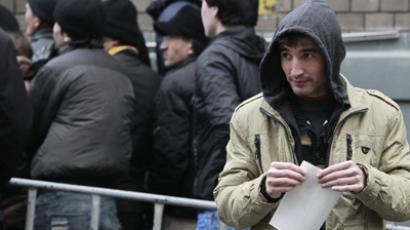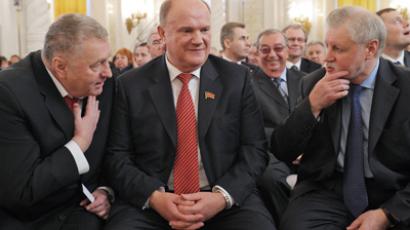Viral war waged to take over Kremlin
All is fair on the online election battlefront. As Russia's presidential campaign heats up, political activists are embracing the internet. Whether promoting ideas or spreading fears, web campaigning is playing a bigger part than ever before.
Virtual political campaigns don’t lack real punch, with every side trying to be as creative as possible in sinking opponents and making their candidate shine.Pro-Kremlin bloggers make fun of the opposition, portraying them in prayer outside the American embassy on Sundays – claiming they're connected to the US State Department. The opposition, meanwhile, makes mocking cartoons about politicians made out of LEGO.Thanks to the internet, putting information out there is becoming easier all the time, but it is a different medium to television. While on TV it can be sufficient to look into the camera to attract viewers' attention, an online political video has to be provocative, brazen and project a new, unusual image to receive those clicks. Like the video portraying Vladimir Putin as Dobby the house elf, a character from the Harry Potter saga, which became an overnight hit.Apart from catchy images, memorable catchphrases are the ammunition being used against those in the corridors of power. Opposition blogger Aleksey Navalny was among the first to upload his sharp tongue. A year ago, he labeled the ruling United Russia "the party of scoundrels and thieves". The insulting phrase first appeared on the net, but quickly migrated to most other media, as well as spoken debate, in Russia and beyond.The party tried to re-work the catchphrase with a more positive spin. A political ad labeling United Russia “the party of scoundrels and thieves” went on to feature students, teachers, scientists and soldiers, showing that the party works for all citizens of Russia, honest and dishonest alike.The mastermind behind that video, State Duma deputy Robert Shlegel, proved his party can also fight its wars online.“My aim is to provoke, to paint reality darker than it is. Often I don't agree with the statements in my videos. But they work,” he says about the reasoning behind the controversial ad.Rustem Adagamov, one of Russia’s most popular bloggers, says ads by both pro-Kremlin and opposition camps tend to aim at emotions rather then logic.“Technically, the video is made very professionally. You can see that a highly-paid specialist did it. It appeals to primitive responses, but works 100 per cent… But videos from the opposition are just as blatant,” he told RT.Another hot trend of this election season is eavesdropping on politicians and posting recordings online. Those taking part in a massive opposition rally in December were surprised to find out that one of their inspiring leaders, Boris Nemtsov, described them in a phone conversation as “cowardly hamsters from the internet. Penguins. The only thing they can do is type with their fingers on Facebook".“It's naive to expect politeness from any side when we're living in an election year. There are no holds barred in this war, not even interfering in someone's private life,” Adagamov says.Lack of privacy for politicians is already a modern-day reality. And with 50 million Russians going online today – about 40 percent of the adult population – the future is predicted to be filled with online political avatars pushing the boundaries of a virtual world without borders.














